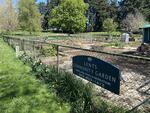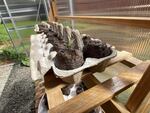Starting with the World War I, the U.S. government was encouraging Americans to grow their own food to help relieve shortages. Originally known as the war garden movement, these so-called "victory gardens" made a reappearance in the 1940s during World War II.
And the idea of growing your own food is still popular — so popular, in fact, that Oregon State University has seen online enrollment for their Master Gardener Short Course Series jump by nearly a thousandfold.
"In a normal year, we might get 20 to 30 folks who will enroll in one of those short courses," said Gail Langellotto, the program's statewide coordinator and a horticulture professor at OSU. "But this year we have over 29,000 who registered for our vegetable gardening course alone."

Salad greens growing in a backyard garden in Southeast Portland.
Crystal Ligori / OPB
The introductory course covers the basics, everything from an introduction to soil and composting, to what types of crops grow best in different regions. It normally costs $45, but OSU decided to waive the fee through the end of April.
The master gardener program works with more than 4,000 volunteers who help receive and reply to the public's gardening questions. Langellotto said they receive around 150,000 gardening questions each year from Oregonians.
“As a beginner's course in vegetable gardening, we’re giving you the information that you need to set you up for success,” Langellotto said. “But things happen in the garden and just because you don't have success with one crop doesn't mean you're not a good gardener.”
One more thing for gardeners both new and old to consider this season is social distancing if they’re working in community gardens or shared garden spaces.

Just one of the many new places people are social distancing: community gardens. Portland Parks & Recreation has kept community gardens open while adhering to public health guidelines.
Crystal Ligori / OPB
“Don't share tools or common resources,” Langellotto said. “And follow cleaning practices in place for items that multiple people might touch, such as the hose or a spigot.”
She said her colleagues at North Carolina State University extension have even put out recommendations for best practices for social distancing in community gardens and shared garden spaces.
With disruptions in the global food chain and many food distribution services stretched thin, Langellotto said, gardening is a way to take direct control of your access to fresh foods.

An old egg crate doubles as a container to sprout seeds in a home greenhouse.
Crystal Ligori / OPB
Not only are you able to provide for yourself, your family, and your neighbors, Langellotto pointed out, “you're also able to make direct decisions about what it is that you want to eat, growing things that might be more difficult to find in the stores.”
Gardening can also be good fuel for the soul: “Growing something is such a wonderful recreational and therapeutic activity for many folks across generations to take part in this unusual time that we're in.”
Use the audio player at the top of this story to hear the entire conversation.